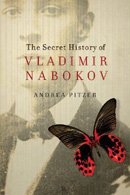Public Radio International’s “The World” features The Secret History
In case you missed it, last week I got a chance to talk about The Secret History with Marco Werman, host of Public Radio International’s “The World.”
We discussed Nabokov’s gift for outrunning history, 20th-century anti-Semitism, and Solzhenitsyn, among other things. At one point, Werman asked about the reception the book is getting, and I somehow ended up referencing Depeche Mode.
Werman: Yeah. I’m interested to know what critics have been saying to you about this book because so many people see Nabokov strictly, as you write, to “art for art’s sake”. Leave the back story out. What do you think about that and what have you heard?
Pitzer: It can be tricky because I think everybody, critics, scholars, general readers, have their own Nabokov. It’s like your own personal Jesus. They have their own Nabokov and some have felt that looking this closely at history is somehow to tie these stories down or to strip them of their magic in some way. And I would agree that if you just reduced his works to nothing but a series of chronological illusions, that would definitely be flattening the novels out. But I think to ignore this history that’s embedded in the books is really to miss half the story.
I’m not so much interested in revisiting “Personal Jesus” as I am underlining why this history matters. Nabokov’s writing has generated a plethora of books and essays exploring the literary allusions buried in his work and what they mean for the stories he was telling. It’s my hope that The Secret History complements all that fabulous spelunking by doing the same thing with Nabokov’s historical allusions.
You can hear the whole PRI interview, as well as listen to me read an excerpt from the first chapter of the book, here.
In other news, I recently weighed in on a Nabokov/Great Gatsby literary hoax for David Haglund over at Slate and got a nice shout-out in the Los Angeles Times from writing guru and biographer Ben Yagoda. And the Midwest Book Review wrote up The Secret History, calling it a “seminal work of painstaking research and scholarship.”
More soon on upcoming readings in the Midwest and on the West Coast.
